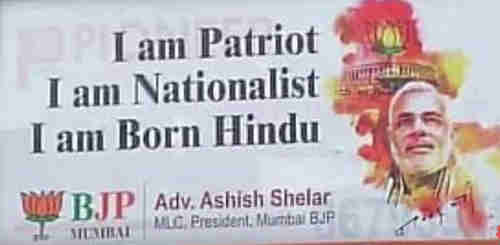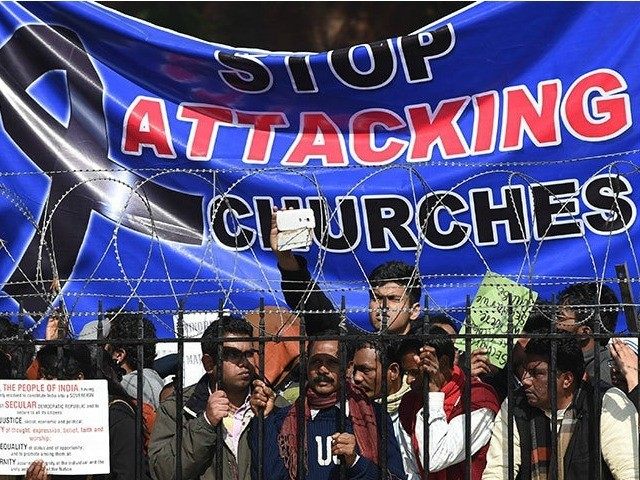This morning’s key headlines from GenerationalDynamics.com
- India’s increased violence against Christians blamed on Hindu activism
- Tensions grow between India and America over religious intolerance
- Growth of Christianity in India attributed to proselytizing by missionaries
India’s increased violence against Christians blamed on Hindu activism

Hindu nationalist political poster
Hindu nationalists (hindutvas) are being blamed for 30 incidents of violence against Christians in India in the first two months of 2016.
In many of the incidents, police just stand by and allow the violence to continue. For example, police stood idly by on January 29 in the province of Tamil Nadu when a mob of 30 Hindu activists attacked and beat a Catholic priest and three Church officials.
Many people blame the rise of anti-Christian violence on ambiguous attitude of India’s government against religious intolerance, especially since the 2014 election of avowed Hindu nationalist Narendra Modi. Constitutionally, India is a secular state that welcomes all religions, in addition to Hinduism, but intolerance to Christianity, Sikhism, Islam and other religions has been growing since Modi’s election.
Hindu nationalism is controversial in India because opponents associate it with “Hindutva violence,” where the Hindutva movement began in 1923, led by terrorist Veer Savarkar (Vinayak Damodar Savarkar), mostly as a movement against British colonization. (See “‘Hindutva’ terrorist violence against Muslims shocks Indians” from 2008.) Modi became associated with Hindutva violence in 2002, as Governor of the Gujarat province, when he allegedly looked the other way when a train with Hindutva activists attacked a group of Muslims, triggering sectarian violence that led to hundreds of deaths and displacing more than 150,000 people, mostly Muslim. ( “15-Sep-13 World View — Hindu nationalist nominated as India’s prime minister”)
According to Savarkar, Hinduism means people born in the “land of India” (Hindustan), who recognize the land as the holy place of their ancestors. They make up an ethnic entity united by the love for this common homeland and by common blood. The hindutva doctrine defines Muslims, Christians and other “heretical” minority groups as those whose land of origin is elsewhere and who, therefore, cannot love the land of India, thereby providing activists with a rationale for discrimination, or expelling them from India or, in recent years, killing them.
Although Modi and his ruling Bharatiya Janata Party (BJP) party have not supported or praised the attacks against Christians, they have not spoken out against them either, according to David Curry, president and CEO of Open Doors USA, a Christian nonprofit organization:
The central government [of India] has refused to speak out against the atrocities – thus further encouraging radical Hindus to step up their discrimination against Christians. The government’s tolerance — if not promotion — of discrimination against Christians has led to a marked rise in the number of people within India openly pushing for a completely Hindu India.
Modi’s unwillingness to speak out against anti-Christian violence is leading to charges that Modi is implicitly supporting the hindutva violence against Christians, as he allegedly implicitly supported the hindutva violence against Muslims in 2002.
From the point of view of Generational Dynamics, xenophobia and nationalism are growing in almost all countries around the world, as the survivors of World War II die off. Those survivors learned the lesson of how xenophobia and nationalism lead to the most horrific of wars, but the lessons they learned are almost completely forgotten today, as we go deeper into a generational Crisis era. Fox News and South Asia Terrorism Portal (2001) (SATP – India) and Zee News (India)
Tensions grow between India and America over religious intolerance
Last month, eight American senators and 26 members of the House of Representatives wrote to India’s prime minister Narendra Modi expressing “particular concern” over the treatment of Christians, Muslims and Sikhs in India. This was the latest action by US officials targeting Modi’s religious intolerance.
In 2005, Modi was denied entry to the United States on grounds that he bore a share of responsibility for the massacre that resulted from Hindutva violence in 2002, when he was Governor of the Gujarat province, as described above. The ban was kept in force until 2014, when Modi was elected prime minister.
If violence by Hindu activists continues to grow, this will continue as a political issue. Economist
Growth of Christianity in India attributed to proselytizing by missionaries
Demographic figures for India show what is apparently a contradiction, when comparing the population of Sikhs with the population of Christians. During the period 1991 to 2011, the fertility rate for Sikh women was 3.9 children per woman, while it was 3.8 children per woman for Christians.
And yet, during that same period, the Sikh population grew at an average rate of 1.2% per year, while the Christian population grew at the rate of 1.9% per year. Based on the relative fertility rates, the population of Sikhs and Christians should have been growing at around the same rate, but the Christian population grew much faster.
The difference is believed to be due to conversions. Sikhs do not proselytize, while Christian missionaries do proselytize, and convert people of other religions to Christianity. By comparing the growth rate of the two populations, and assuming that the differences are due to proselytization, then it’s possible to compute that Christian missionaries in India have converted to Christianity 170,000 people of other religions, including Hindu and Muslim religions.
Anecdotal evidence indicates that a large percentage of the converts to Christianity are in the “untouchable” Dalit caste. According to Hinduism, Dalits are outcasts at the bottom of the spiritual scale of human worth, resulting in social stigma, denial of education, bullying and discrimination in housing and jobs.
People who are considered unfit to enter a Hindu temple are converting to a religion where they are welcome.
Apostasy is among the greatest of sins in almost every religion, including Christianity. In Pakistan, apostasy is given as a reason by terrorist groups of mass slaughter of Shia Muslims. Someone converting from Hinduism to Christianity is considered an apostate. If the reports are true that Christian missionaries are converting huge numbers of Hindus to Christianity, then anti-Christian nationalism and violence is very likely to grow among hindutva activists. Indian Express (1-Sep-2015) and Charisma News (Christian)
KEYS: Generational Dynamics, India, Hindutva, Hindu Nationalists, Narendra Modi, Bharatiya Janata Party, BJP, Veer Savarkar, Vinayak Damodar Savarkar, Pakistan
Permanent web link to this article
Receive daily World View columns by e-mail

COMMENTS
Please let us know if you're having issues with commenting.